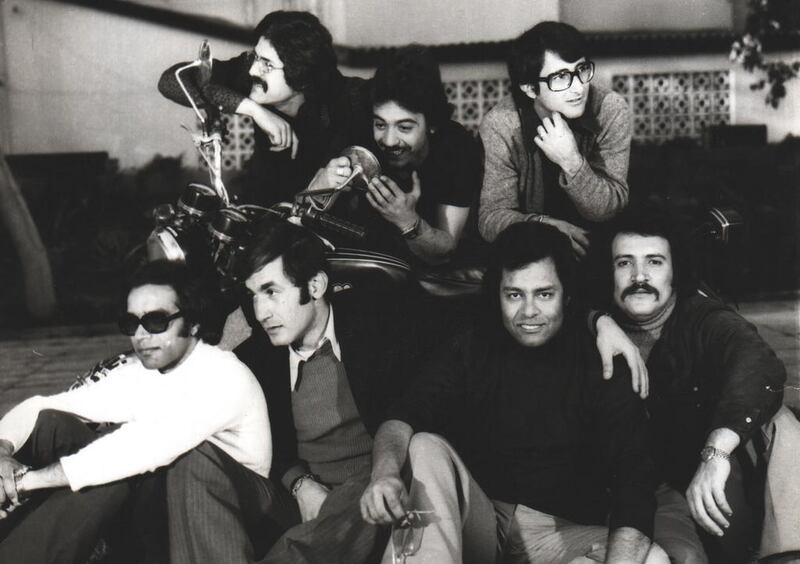Egyptian band Les Petits Chats captured the hearts and dancing shoes of thousands of young people during the 1960s and 1970s.
Through vintage photos, crackling film footage and the musicians reminiscing about days gone by, the band have now been featured in a new documentary.
Les Petits Chats, set for limited release in Egypt, looks at the group's popularity but also tries to capture a period of time that has become almost imaginary to my generation.
It is that period our parents pine for, “Ayam Zaman” – the old days – when the music was good, but you couldn’t get foods such as ketchup because of nationalist policies restricting imports, and when the trauma of the 1967 and 1973 wars was felt by everyone.
The documentary zooms in on a period also described as the “Romantic Era” – a golden time during the 1960s and 1970s. For some, these are viewed as the country’s best years for music, film and culture.
But what happens when such romanticism is confronted with the realities of today? Is it just nostalgia we’re feeling, or were the times really better back then? And just how did Les Petits Chats, a cover band that played Western hits, become so popular? These are some of the questions asked by director Sherif Nakhla’s documentary.
Putting aside politics, which the film carefully does, Nakhla keeps our focus on the band, despite it having been made during one of the most turbulent times in Egypt’s recent political history – between 2011 to 2016.
The film opens with a sharp dose of reality: Les Petits Chats’ big 2009 comeback gig is cancelled because of a horrific train accident that left at least 50 people dead and more than 30 injured. The band later reconvened and their long-awaited reunion gig would be rescheduled later that year.
As the band rehearses in a Cairo studio, Nakhla uses testimonials to go back in time. We hear from Wagdi Francis, the band’s founder and vocalist; the composer, Omar Khairat, who was the drummer; and Ezzat Abu Ouf, known for his family band, 4M, and later for his many TV dramas and films.
Nakhla also gets commentary from pop-culture journalists such as Mohamed Salmawi and actors from the period such as Samir Sabry. We hear from Sabry: “Egypt witnessed during the 1960s the golden age of everything – golden age of music, of the press and of theatre. At the same time ballet troupes were formed and national art troupes were created. And the ministry of culture supported dance leaders like Mahmoud Reda – so there was a big music movement at the time.
“And this artistic movement changed everything… It encouraged young people to love art and practise it. It was also the romantic era of cinema with actors like Faten Hamama and Magda and Shadia and Emad Hamdi.”
Les Petits Chats was formed in Cairo in 1967 as a quintet – Francis joined up with Abu Ouf and Khairat, as well as Beirge Andreassian and Freddy Risz. In a book that will be distributed along with the film, Francis notes that the band was formed just after the 1967 Arab-Israeli war: “Egypt was stressed by its defeat. The band was, perhaps, our escape towards light, and music was the means. I believe that Les Petits Chats was the relief for a great deal of the Egyptian youth during that era.”
Along the way, the band went through many formations but the musicians that stand out are Abu Ouf, Khairat, Khorshid and Hany Shenouda. The talent of the individual members is what made Les Petits Chats so good. Khorshid is arguably one of Egypt’s best guitarists (playing in Abdel Halim’s orchestra), while Shenouda went on to become a major producer between the 1970s and 1990s, helping to produce talent like Mohamed Mounir. In the 1970s alone, the musicians of Les Petits Chats helped to largely create the fleeting rock movement that took place at the time, with members forming other bands such as Tiba, 4M and Al Masrayeen.
Meanwhile, Abu Ouf continues to perform and had a stint as the Cairo Film Festival director. Khairat eventually gave up the drums for the piano and began composing – he still performs at the Cairo Opera House.
The film relies heavily on the covers that Les Petits Chats sang to evoke the feeling of the era, The Beatles' Let it Be or Peppino Gagliardi's Tamo e tamero set along vintage images of Alexandria's Montazah Palace and Palestine Hotel.
The band performed in English, mainly due to the fact that western music was trendy at the time and it fitted in with the cosmopolition atmosphere in Cairo and Alexandria. They never sang in Arabic, and through the nationalism of the Gamal Abdel Nasser period, they were one of the few ways that young Egyptians could hear and dance to western music.
When listening to the soundtrack and watching a vintage Cairo roll by, it’s hard not to feel nostalgic for the images and songs presented in Nakhla’s film.
“The film has a test – to establish the romantic era, to open everyone’s eyes to it,” the director says. “It’s something we all know existed but we didn’t feel it the way the band felt it. And I wanted to see if the band would be able to bring that back even for one night.”
Les Petits Chats stopped performing in the 1980s, but have started playing again since their 2009 comeback. On New Year’s Eve the band performed in Cairo, and in January they sold out the Cairo Opera House. A new tour is also planned.
Maha El Nabawi is a freelance journalist based in Cairo who writes on music and culture.










